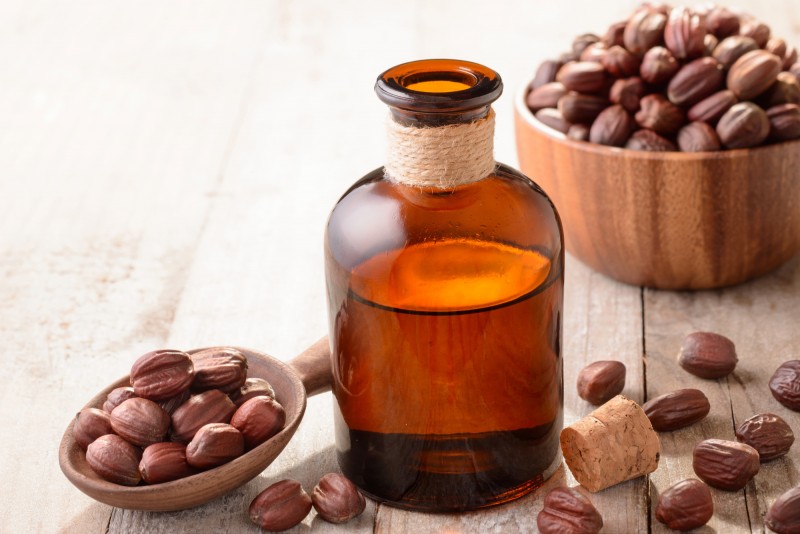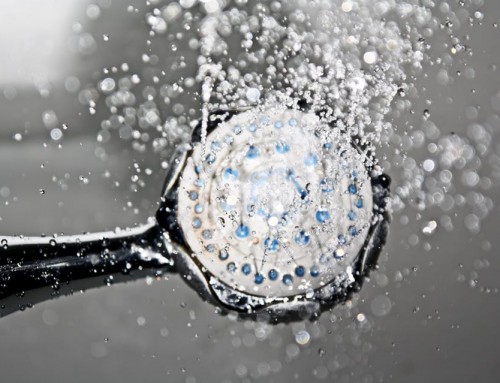If you’re looking for the perfect product to add to your beauty routine, look no further.
Jojoba oil, made from the seed of a desert-thriving plant, is often referred to as liquid gold. As a skin care product, jojoba oil benefits include incredible moisturizing and antioxidant properties.
Perfect for all skin types, jojoba oil is the secret weapon of the beauty world. You’ll likely find it hiding in the ingredient label of many products already in your collection, but why not use the oil itself?
Read on to find out why jojoba is the ideal natural skin care product you need to add to your skincare regimen.
What is Jojoba Oil?
While it’s called an oil, jojoba is actually a “wax ester plant extract.” Native to the Southwestern portion of the United States, jojoba plants produce seeds that contain this beneficial extract. The honey-gold oil of jojoba seeds was even utilized by Native Americans for skin and hair care, and moisturizing tanned leathers.
Today, jojoba oil is used in an extensive range of skincare and beauty products. Popular far and wide, jojoba plants are cultivated around the world in places like Peru, Argentina, Australia, and more.
1. Perfect Moisture
Jojoba (pronounced ho-ho-ba) is a humectant moisturizer. This means it seals your skin in a barrier of protection to hold moisture in the dermal layers. Not only does it penetrate the skin, jojoba oil actually promotes your natural acid mantle to keep bacteria and dryness at bay.
2. Antibacterial Benefits
In lab tests, jojoba has been found to contain antifungal and antimicrobial properties. It doesn’t kill all types of bacteria, but it can fight certain ones like E. coli, salmonella, and candida (yeast) infections.
3. Acne Treatment
Acne and the symptoms of acne can be difficult to treat. Jojoba targets multiple symptoms of acne with its many benefits.
Jojoba as a healing booster and anti-inflammatory can treat inflammation and acne scarring. This oil’s natural antibacterial properties can aid in ridding the skin of acne-causing bacteria, promoting healthy skin balance.
Lastly, it is a safe way to deliver moisture to acne-prone skin without further irritating painful acne spots.
Though not a cure-all for acne, the use of jojoba with other products may ward off mild acne and help create a more balanced environment where acne cannot flourish.
4. Antioxidant Powers
Antioxidants are crucial to maintain cellular health and fight off free radicals. Luckily, jojoba contains some forms of vitamin E. This essential antioxidant can reduce the effects of toxins and pollutants to keep skin healthy.
5. Sebum Regulation
Jojoba’s perfect texture masquerades as your skin’s own sebum. Maintaining a balance in the skin’s moisturize barrier with such a product means the body won’t try to produce as much oil to keep skin hydrated and protected.
Though using an oil might seem counter-intuitive for oily people, the right oil can actually help regulate and normalize the sebum production in your body. Oily skin is often caused by excessive dryness or lack of oils. Balancing out the skin with a natural oil like jojoba can help slow down overactive oil glands.
6. Non-Comedogenic
Jojoba is so similar to the natural sebum of your skin, that it will not cause clogged pores. This makes it a perfect skin care ingredient, whether as a carrier for other oils or alone.
This valuable benefit means fewer acne breakouts and less skin buildup.
7. Inflammation Fighter
Jojoba is a natural healer and anti-inflammatory. If you suffer from eczema or psoriasis, this natural oil could help relieve symptoms such as dryness or flaking
Angry and irritated skin will quickly absorb this oil like it would the body’s natural sebum, which can help target inflammatory skin conditions.
8. Hypoallergenic
Technically speaking, jojoba is actually a wax, even though it is liquid at room temperature. This substance is not an irritant for most people, which means it will be gentle and soothing even on sensitive skin.
9. Collagen Synthesis
As we age, collagen levels reduce in the skin. A protein found in skin, collagen is an important factor in the youthfulness of skin’s appearance. When collagen levels fall, the bouncy and plump look of skin begins to recede.
Fortunately, antioxidants like the ones found in jojoba oil can help promote collagen synthesis. Some studies suggest that these important ingredients can promote collagen production and skin’s own regenerative properties.
10. Wound and Scar Healing
Research has found that jojoba oil might help skin heal after injury.
Often considered a great healing agent for acne scars, this could have to do with jojoba’s vitamin E content aiding the skin cell turnover process after a wound. Vitamin E has long been recommended by skin professionals as a powerful scar fighter.
11. Sunburn Relief
Found in many natural sun and after-sun products, the antioxidants in jojoba may help prevent sun damage in overexposed skin.
Jojoba can also help with the inflammation and dryness found in the skin after sun damage. This gentle product is a safe way to deliver moisture and vitamin E back into them without causing pain or irritation on damaged skin.
12. Anti-Aging
Botanicals with antioxidant properties can help improve skin’s regeneration and elasticity. Reducing oxidative stress in the skin with botanicals like jojoba oil can minimize the appearance of fine lines and wrinkles, and slow the signs of aging.
Get Jojoba Oil Benefits Today
You need an excellent all-around skin care product that can deliver many jojoba oil benefits to any type of skin. From healing scars to balancing the moisture barrier, jojoba may very well be the gold standard in skin care. Whether in cleansers, moisturizers, or all on its own, your skin will thank you.
For more skincare, beauty, and wellness secrets, visit our Beauty section at Estilo Tendances.











